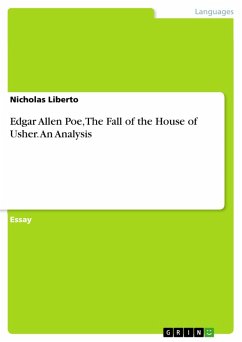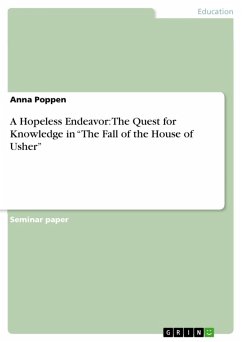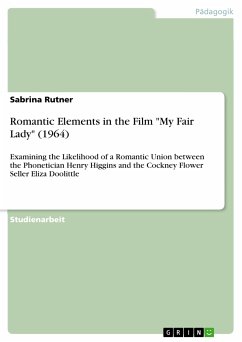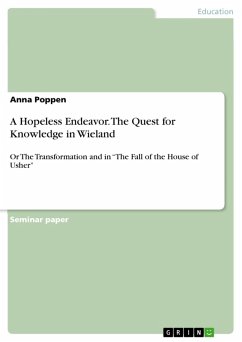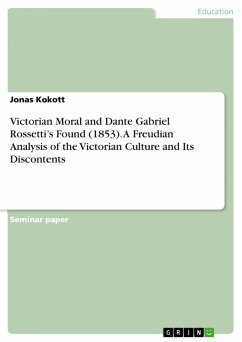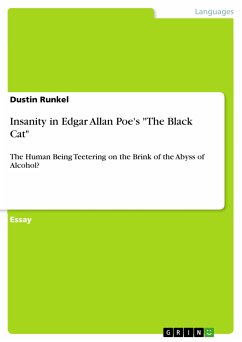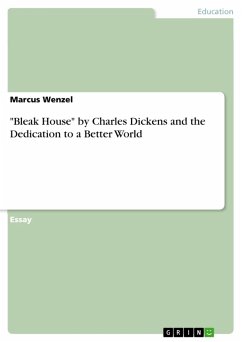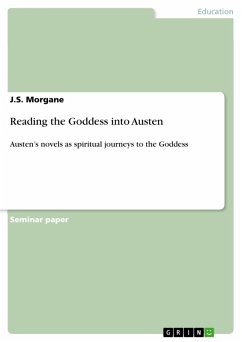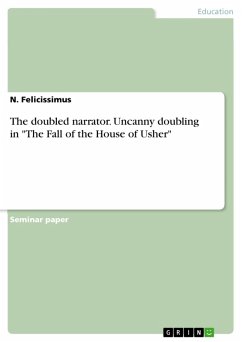
The doubled narrator. Uncanny doubling in "The Fall of the House of Usher" (eBook, PDF)
Sofort per Download lieferbar
Statt: 17,95 €**
13,99 €
inkl. MwSt. und vom Verlag festgesetzt.
**Preis der gedruckten Ausgabe (Broschiertes Buch)
Alle Infos zum eBook verschenkenWeitere Ausgaben:

PAYBACK Punkte
0 °P sammeln!
Seminar paper from the year 2014 in the subject Didactics for the subject English - Literature, Works, grade: 1,0, University of Würzburg, language: English, abstract: "The Fall of the House of Usher" is a short story full of ambiguity, uncertainness and uncanniness. According to Poe's "The Philosophy of Composition", a good story needs "the totality, or unity, of effect". This unity is created through the use of dualism. Oppositions and literary doubling are the fundamental frame of this tale. Thus, it is explicable why there are still so manifold interpretations to various themes and motifs...
Seminar paper from the year 2014 in the subject Didactics for the subject English - Literature, Works, grade: 1,0, University of Würzburg, language: English, abstract: "The Fall of the House of Usher" is a short story full of ambiguity, uncertainness and uncanniness. According to Poe's "The Philosophy of Composition", a good story needs "the totality, or unity, of effect". This unity is created through the use of dualism. Oppositions and literary doubling are the fundamental frame of this tale. Thus, it is explicable why there are still so manifold interpretations to various themes and motifs today. The aim of this paper is to elabo-ate the effects of doubling on the homodiegetic narrator. It will be made the attempt to support the thesis that the narrator could be seen as a doubled person himself. Firstly, it is necessary to point out important psychological concepts and perspectives concerning doubling and so-called doppelgangers. Apart from the psychoanalysts Jentsch and Freud, who have made basic contributions to the term Doppelgängertum, also the results of Webber and Thompson will be helpful to find an appropriate frame to own interpretations and text work. After having analyzed the efects of a doubled narrative structure in the text, the narrator will be observed as a personified duality of a therapist and a patient. This thesis will be part of the next chapters, which focus on the doubling relationship between the narrator and the house respectively Roderick. The intention of this paper is not to restrict on a single issue of doubling, but to encounter narrative structures, effects of uncanniness, a therapist-patient role and the dualism of reason and madness. By covering so many fields, it will be shown that doubling itself is the essential and unifying effect of the tale.
Dieser Download kann aus rechtlichen Gründen nur mit Rechnungsadresse in A, B, BG, CY, CZ, D, DK, EW, E, FIN, F, GR, HR, H, IRL, I, LT, L, LR, M, NL, PL, P, R, S, SLO, SK ausgeliefert werden.




